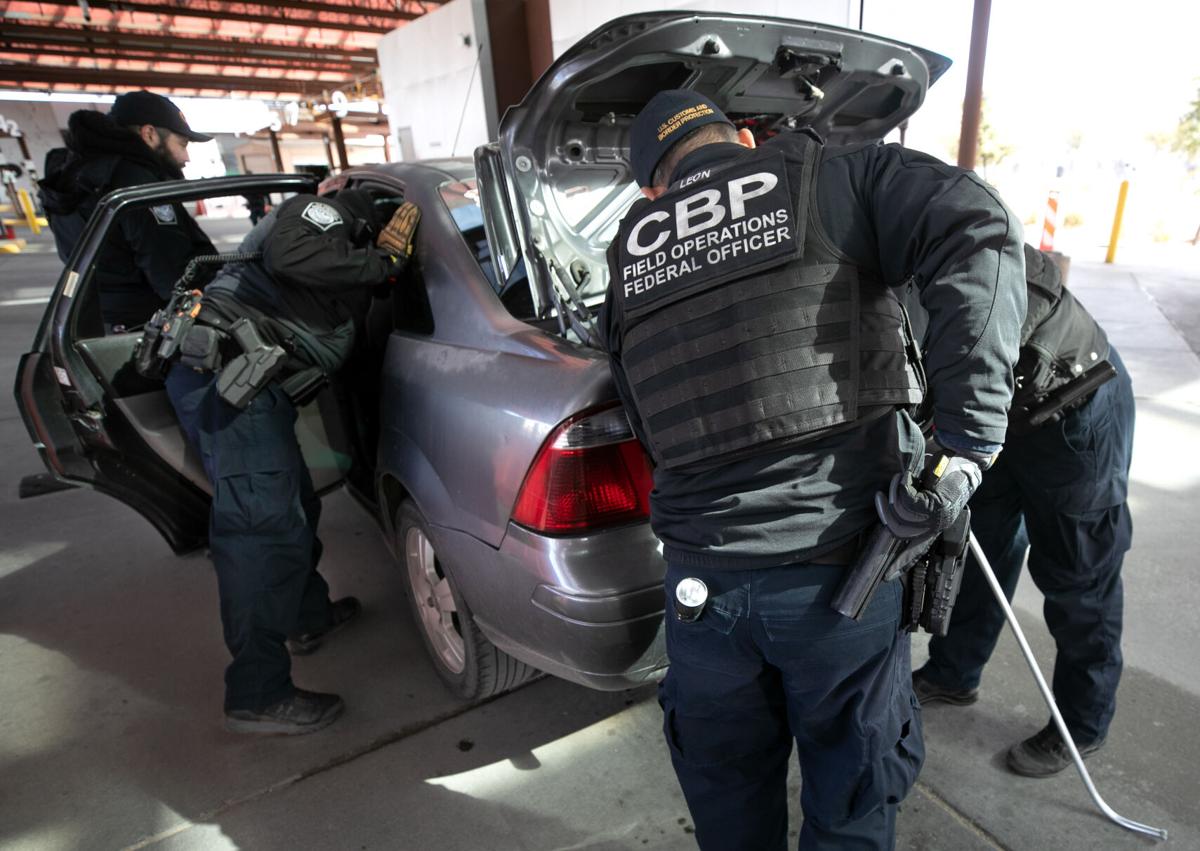It took 1 hour and 38 minutes Thursday afternoon to crawl from the back of the vehicle line to the inspection station at the DeConcini Port of Entry in downtown Nogales.
The inspection itself? Less than a minute.
That inspection was detailed enough in our case: My colleague Danyelle Khmara and I are U.S. citizens who were bringing nothing more than a handful of cookies across the border after a few hours reporting in Mexico.
But it struck me again, as we drove into Nogales, Arizona, how impossible the task is of stopping people from bringing packages of illegal pills — fentanyl and the like — into the country.
U.S. inspectors seize a lot of them — more than 11,000 pounds at Mexican-border ports in the six months through January — but it can’t be more than a small fraction of the total coming across. Unlike the bulky marijuana that occupied so much effort over decades of the drug war, the pills are tiny and easy to hide.
Fifty years of experience tells us that, unfortunately, there is no realistic way to stop these devastating drugs from coming into the country. Many of our families, including my extended family, are dealing with the disastrous result. But if we couldn’t stop bundles of weed, we aren’t going to stop bags of pills.
Despite that, last week we found ourselves embroiled in another go-round of threats and recriminations between the United States and Mexico over fentanyl.
GOP members of the U.S. Congress threatened military action in Mexico against the so-called “cartels,” a word invented and used to create a sense of existential threat. In response, Mexican president Andres Manuel Lopez Obrador, formerly an ally of President Donald Trump, threatened to badmouth Republican candidates to Hispanic voters in the U.S.
Both sides smacked of ridiculousness.
The GOP members of the House and Senate who have supported military attacks across the border on Mexican drug traffickers have shown no path to success:
They treat the “cartels” as sort of monolithic paramilitary corporations, instead of the shape-shifting network of alliances that they really are
They ignore or underestimate the likely deaths and injuries resulting from any attack on drug traffickers or their facilities in Mexico, and the resulting fallout
They fail to show how or why any destruction of drug-trafficking sites wouldn’t simply lead to a shift in manufacturing and trafficking patterns, as has happened before.
Threatening military action in Mexico, or actually carrying it out, may make some people feel like they’re doing something serious about the problem, but 50 years of Drug War experience tells us it will not have any long-lasting effect.
Mexico has tried a military attack on drug traffickers before, during the administration of Felipe Calderon, from 2006-2012 — a period that former U.S. Attorney General William Barr applauded in a recent Wall Street Journal op-ed supporting U.S. military intervention. It did not stop the drug supply but escalated violence in Mexico to the levels that persist today.
You can take out a capo, you can wipe out fields of poppies or coca, you can dismantle a lab, and yet the problem goes on, with illegal-drug prices rarely even increasing from our wildest successes.
Now, the American congressmen weren’t the only ones making absurd assertions over this conflict.
Lopez Obrador was lying when he said Thursday: “Here, we do not produce fentanyl, and we do not have consumption of fentanyl.”
It wasn’t even a month ago when, on Feb. 14, Mexican soldiers raided a laboratory in Sinaloa and seized 630,000 pills. Mexicans produce lots of fentanyl, using chemicals largely obtained from China, and send them on to the United States, through ports of entry like the ones in Nogales.
So that comment was insulting, but he was sadly on point in his subsequent comments.
“We regret deeply what’s happening in the United States, but why don’t they address the problem?” Lopez Obrador went on. “Why don’t they take care of their youth? Why don’t they address their problem of social decay? Why don’t they tamp down the growth in the consumption of drugs?”
I don’t deny that the supply of cheap opioids helps create its own market, so suppliers in Mexico bear some responsibility for our addiction crisis. But indeed, as Lopez Obrador suggested, why don’t we focus on ourselves, the consumers, rather than the suppliers outside our borders?
Internationally, the United States is an outlier, with the worst opioid-addiction problem in the world. It’s an outgrowth of the over-prescription of OxyContin and other prescription narcotics beginning more than two decades ago, but it’s also a symptom of deeper problems that Mexico’s president was alluding to.
Family disintegration, a torn social safety net, uneven education opportunities, unaffordable housing and expensive health care — these social factors all help create the market that fentanyl producers and dealers are exploiting.
We could deeply inspect every vehicle and person crossing into the United States from Mexico, catching all the fentanyl and causing waits that last for days instead of hours, but that wouldn’t stop the problem.
Suppliers would happily use other routes as long as we have a market to supply. Imagine all the ships and planes coming into the United States daily, all the vast empty spaces on the Canadian border where smugglers can cross. The package of pills, or the chemicals to make them, would easily find a way.
But maybe if we put the same energy into reducing demand that we put into stopping supply, we could start to have a lasting impact. In the end, it’s the only way.
Get your morning recap of today's local news and read the full stories here: tucne.ws/morning





